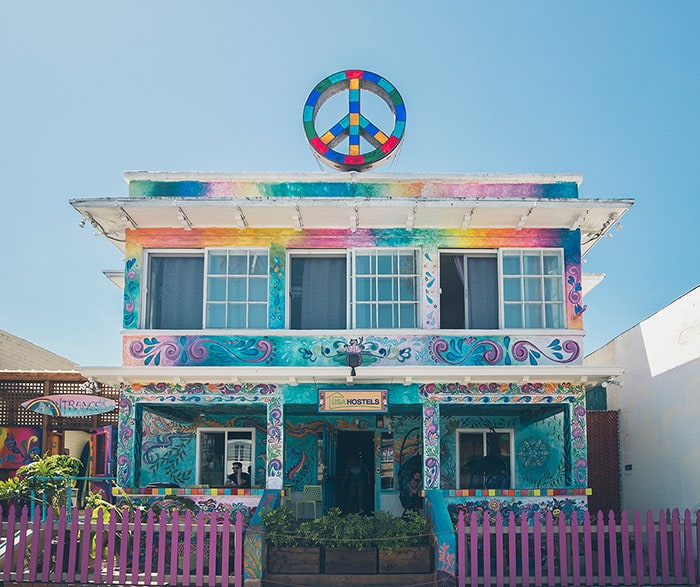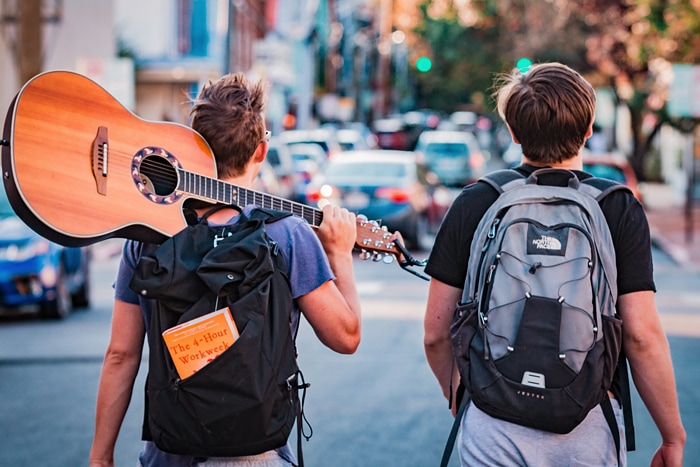When researching where to stay on your next trip, you may have noticed crazy-cheap rates for hostels. $22 a night to stay in the center of Rome and there’s free Wi-Fi and a trendy bar in the lobby?! What’s the catch? What is a hostel, really?
When you hear the word “hostel,” you might have visions of sharing a bunk bed in a seedy dorm room with a backpacker named Dave who hasn’t showered in five days and has no concept of personal space.
But what are they really like? Are they safe? Do they have amenities? Can you stay in one without taking home a rare communicable illness as a souvenir?
Here’s what you need to know before booking a hostel.

What Is a Hostel?
Hostels, sometimes referred to as “backpacker hostels” or “youth hostels,” are a low-cost alternative to hotels for the budget-conscious traveler. This was literally the nicest way we could say you’re broke.
Most hostels offer a basic-but-clean place to crash, and the social vibe and shared accommodations make them a perfect spot for solo travelers to make friends.
And did we mention they’re cheap? For instance, the Hideout Hostel in Siem Reap, Cambodia, charges $3 for a shared dorm-style room and $30 for their high-end superior double room. (Our beer goggles work just fine thank you very much, but TripAdvisor likes them too.)
Hostels are able to offer these low rates because they maximize the number of people they can sleep per night through their shared rooms. Since they house more people per square foot than a hotel, they can charge less for the bed.
https://www.youtube.com/watch?time_continue=10&v=Km9XGtUagCo
Do I Have to Sleep in a Shared Room?
How else do you expect to make friends?
Honestly, it depends. You’ll typically get a choice of accommodations when you book. That could be a two-bed private room with an attached bathroom, or a bed in a 20-person dormitory where people are crammed in like the New York subway and you quickly learn that Jennifer is lactose intolerant. Maybe doing milk shots was a bad idea.
Bunk beds are the unofficial mascot of the hostel world, so unless you’ve explicitly booked a private room — or are traveling in a big enough group to monopolize an entire room for yourselves — if you want really cheap rates, expect to bunk with a stranger.
Who Stays at a Hostel? Is There an Age Requirement?
Unless a hostel explicitly caters to a certain age group, you’re never “too old” to stay in a hostel (nope, not even if it’s called a “youth hostel or “backpacker hostel”) Though, if you’ve reached the ancient age of 30, your old bones might want not want to risk staying on the top bunk.
Most people who stay in a hostel are in their 20s and 30s, because that’s usually what we can afford between student loans, ClassPass subscriptions, personalized vitamins, and our mortgage payment.
Still, everybody loves a bargain, so there’s no limit to who you’ll meet in a hostel – from the middle-aged German couple who quit their jobs to go vagabonding to the guitar-strumming frat boy who only seems to know the first four chords to Wonderwall.

What are party hostels?
Party hostels are a specific type of hostel that caters to those who want to be extra social.
Party hostels will usually have an attached bar and social events throughout the week like pool tournaments, karaoke, or drinking games.
Find out if that freak beer-pong injury is covered by your travel insurance.
You can spot one pretty easily — they’re usually the highest-rated accommodation on hostel-booking websites, and they tend to be located close to the city center. Party hostels are a lot of fun, but they do tend to get pretty noisy. Kind of like haunted houses. Except these are haunted by live people! Scary.
If you do stay at a party hostel, pack your own earplugs. Sharing is not caring.

What Amenities or Services Do Hostels Have?
The amenities offered depend on where you’re staying. If you’re looking for something other than a place to crash after biking around Amsterdam all day, you’ll want to do your research on a website such as Hostelworld or Hostelbookers before you book.
Most hostels will offer secure lockers where you can stash your passport and valuables in case you brought Pa-Pa’s signet ring with you to Tunisia. Just remember to bring your own lock. If you ask nicely, many will even keep high-value items such as laptops behind the reception desk in case you forgot how to take a vacation.
Other hostel amenities and services might include:
- Breakfast — just be sure to check whether it’s free or paid
- A restaurant and/or lobby bar that is staffed by someone you will find yourself hitting on later
- A communal kitchen where you can prepare your own meals
- Tour opportunities, cultural experiences, and help with itinerary planning
- A pool
- A laundromat or paid laundry services
- Rooftop terraces complete with makeout hammocks
- A book exchange area
- Clean towels

What Should I Pack If I’m Planning to Stay at a Hostel?
We asked hostel employees about the key things guests should bring to a hostel.
- Earplugs — just in case you’re sharing a room with a snorer
- Sleep mask — so you’re not disturbed by people turning on the light at 2am
- Lock — to secure that priceless heirloom
- Lighter — even if you don’t smoke, carrying a lighter gives you an excuse to strike up a conversation with a fellow traveler. You can also use the lighter to get the pilot going in the communal kitchen if it goes out!
- Playing cards — “pass time” with new “friends” who are “nice enough” to keep “losing money,” so you can fund your next trip. Now might be a good time to admit we have an air quotes problem.
Bottom line? Don’t let the price tag scare you away — hostels can be a lot of fun, and you’re guaranteed to meet some fascinating people along the way. Your bunkmate could be your future best friend — or the love of your life. In which case, it might be time to spring for that private room.
- What is a Hostel and Can We Call Dibs on the Top Bunk? - October 9, 2019




Leave a Comment